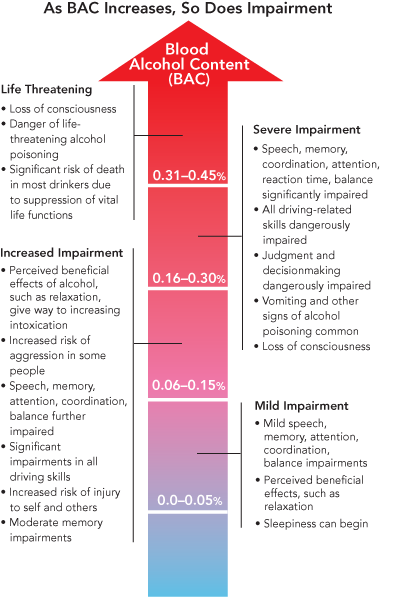
Excessive drinking can be hazardous to everyone's health. Do you know about the dangers of alcohol poisoning? When you should seek professional help? Sadly enough, too many college students say they wish they would have sought medical treatment for a friend. Many end up feeling responsible for alcohol-related tragedies that could have been prevented.
Definition
Alcohol poisoning is a serious, and sometimes deadly, consequence of drinking large amounts f alcohol in a short period of time. Drinking too much too quickly can affect your breathing, heart rate, body temperature and gag reflex and potentially lead to coma and death.
A person with alcohol poisoning needs immediate medical attention. If you suspect someone has alcohol poisoning, call for emergency medical help right away.
Alcohol Poisoning and Your Body.
Alcohol depresses nerves that control involuntary actions such as breathing and the gag reflex. A fatal dose of alcohol will eventually stop these functions. It is common for someone who drank excessive amounts of alcohol to vomit since alcohol is an irritant to the stomach. There is a danger of choking on vomit, which could cause death by asphyxiation.
You should always know that a person's blood alcohol concentration can continue to rise even while they are passed out. Even after a person stops drinking, alcohol in the stomach and intestine continues to enter the bloodstream and circulate throughout the body. It is dangerous to assume the person will be fine by sleeping it off.

Signs of Alcohol Poisoning
Know the danger signs and do not wait for all symptoms to be present.
- Mental confusion, stupor, coma, or person cannot be roused.
- Vomiting
- Seizures
- Slow breathing (fewer than 8 breaths per minute).
- Irregular breathing (10 seconds or more between breaths).
- Hypothermia (low body temperature), bluish skin color, paleness.
If there is any suspicion of an alcohol overdose, call 911 for help. Do not try to guess the level of drunkenness. If alcohol poisoning goes untreated the person(s)
- can choke on his or her own vomit.
- breathing slows, becomes irregular, or stops.
- heart bets irregularly or stops.
- can have hypothermia (low body temperature).
- can have hypoglycemia (too little blood sugar) leads to seizures.
- can be dehydrated. Untreated severe dehydration from vomiting can cause seizures, permanent brain damage, or death.
Don't be afraid to seek medical help for a friend who has had too much to drink. Don't worry that your friend may become angry or embarrassed-remember, you cared enough to help. Always be safe, not sorry.
Dangerous Myths
You cannot reverse the effects of alcohol poisoning, and you could actually make things worse through some actions. Here is what doesn't work:
- Black coffee or caffeine – this does not counteract the effects of alcohol poisoning.
- A cold shower – the shock of cold can cause a loss of consciousness.
- Walking it off – this does not increase the speed alcohol leaves your body.
- Sleeping it off – you can lose consciousness while asleep.
The only thing that reverses the effects of alcohol is time-something you may not have if you are suffering from alcohol poisoning.

Prevention
To avoid alcohol poisoning:
- Drink alcohol in moderation, IF AT ALL. It is against the law to for minors (anyone under the age of 21), to purchase, consume or be in possession of alcohol. If you are of age and choose to drink alcohol, do so in moderation. When you do drink, enjoy your drink slowly.
- Don’t drink on a empty stomach. Having some food is your stomach may slow alcohol absorption somewhat, although it won’t prevent alcohol poisoning.
- Communicate with your teens. Talk to your teenagers about the dangers of alcohol, including binge drinking,. Evidence suggests children who are warned about alcohol by their parents and who report close relationships with their parents are less likely to start drinking.
- Get follow-up care. If you or you know someone that has been treated for alcohol poisoning, be sure to ask about follow-up care. Meeting with a health professional, particularly an experienced chemical dependency professional, can help you prevent future binge drinking.
*Sources: National Institute on Alcohol Abuse and Alcoholism, Center for Disease Control Prevention, and the Mayo Clinic.
